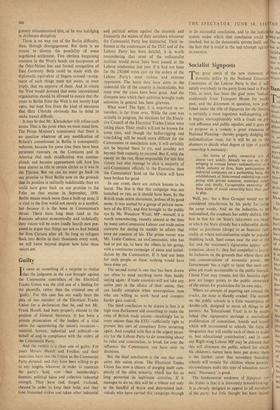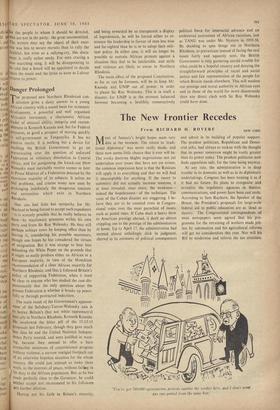Socialist Signposts
. . . the forms of public ownership will of course vary widely. Already we can see it de- veloping in various forms—nationalisation of whole industry or firm, State participation in industrial companies on a partnership basis. the establishment of State-owned undertakings com- peting with private concerns, municipal enu r- prise and, finally, Co-operative ownership. Alt these kinds of social ownership have their rant' to play.
Well, yes: but a Bow Grouper would not be' considered treacherous by his party for tang the same words. And on the industries to be nationalised, the emphasis has subtly shifted. lite first in line for the State's take-overs are those' in which the State already has a substantial share, either as purchaser (drugs) or as financier (a r- craft), or where nationalisation might be popular' (building land). Steel comes near the end of the list, and the statement's signatories appear se conscious about it : they feel compelled to justifY its inclusion on the grounds that where there are vast concentrations of economic power, the Government has a right to insist that such em- pires are made accountable to the public interest. Clause Four may remain, but this Socialist sign- post no longer points to the public ownership of the means for production for its own sake.
Where no amount of papering can conceal the cracks, the issue is blandly evaded. The section on the public schools is a little masterpiece of double-talk, designed to mean all things to all parents. An 'Educational Trust' is to be estab- lished (the signposters envisage a marvellous proliferation of committees, boards and trusts) which will recommend to schools 'the form of integration that will enable each of them to make its best educational contribution'; and in case any Right-wing Labour MP may be alarmed that this will eliminate the public school for which his children's names have been put down. there is the further saver that secondary boarding schools will remain 'for children whose parents' circumstances make this type of education nec-s- sary."Necessary' is good.
The fundamental weakness of Signpost% for the Sixties is that it is tiresomely inward-looking. It is cleverly designed to appeal to all members of the party; but little thought has been spared for the people to whom it should be directed, Who are not in the party: the great uncommitted. The writers may say the object of their exer- cise was less to secure recruits than to rally the faithful; but even as a rallying-cry, this docu- ment is really rather seedy. For men craving a new marching song, it will be disappointing to be told that a board will be appointed to decide upon the music and the lyrics as soon as Labour returns to power.



































 Previous page
Previous page